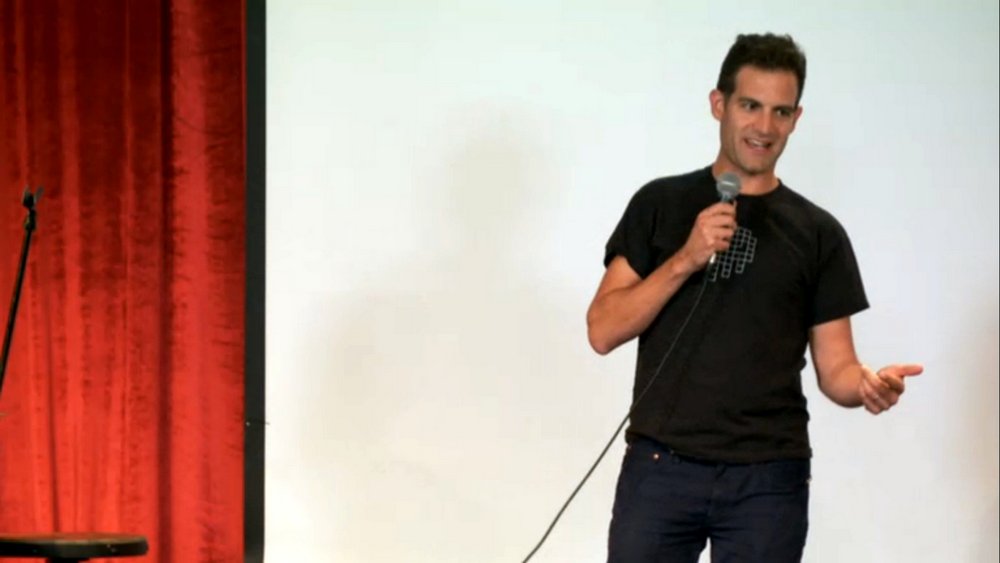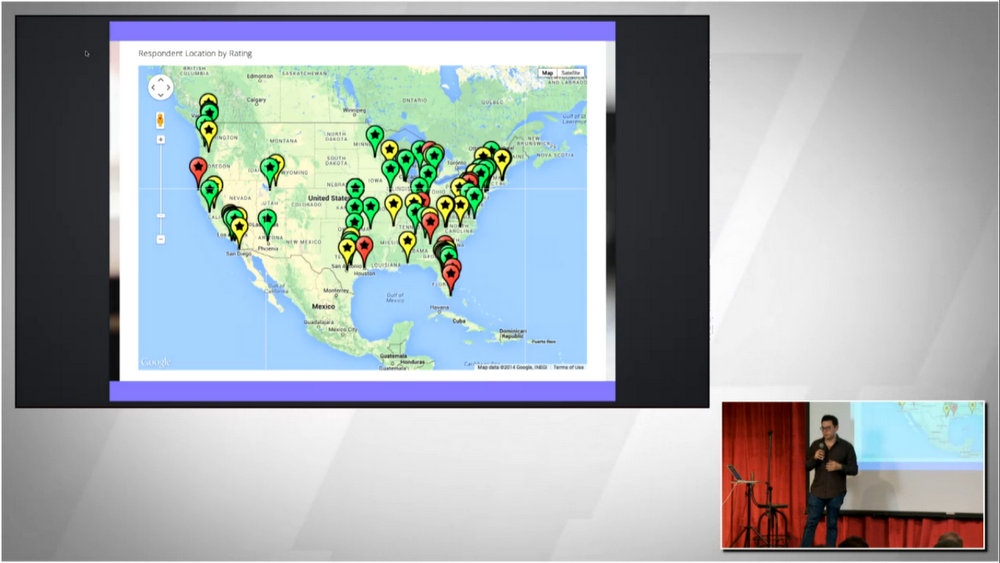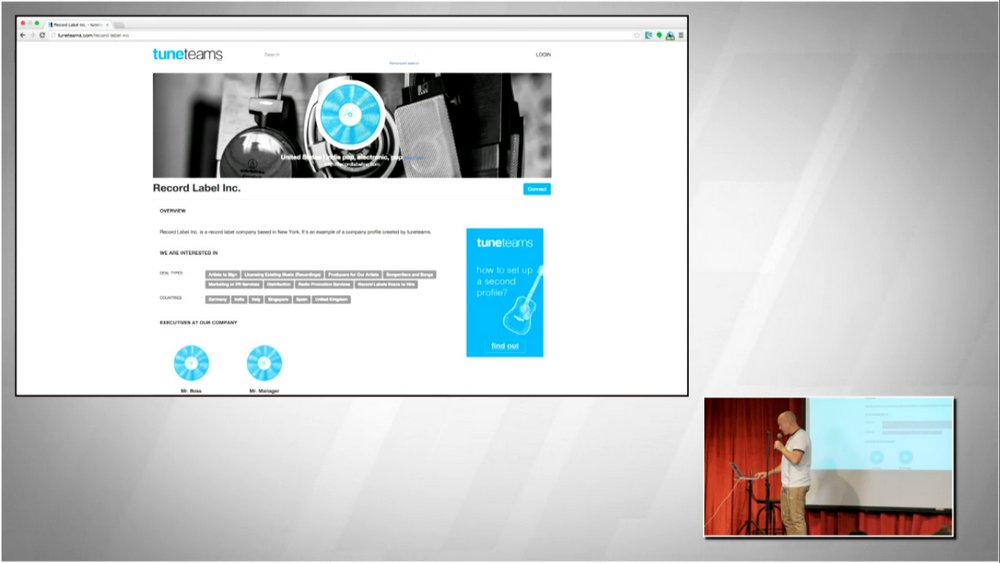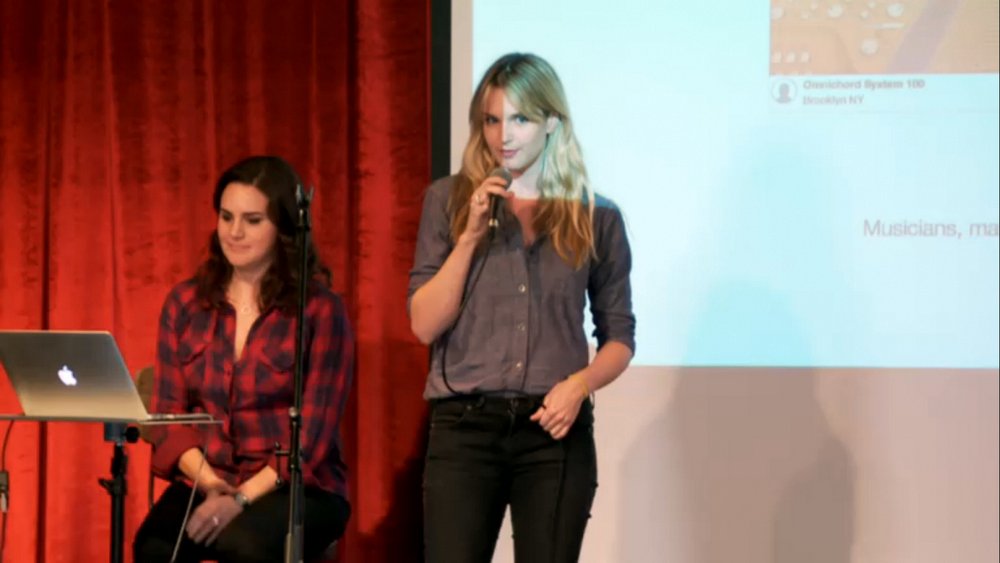The New York Music Tech Meetup moved its most recent gathering out to Livestream Public in Bushwick last Wednesday night.
Featuring presentations from five different startups, with sponsorships from MailChimp, Livestream and Audiokite, the longstanding meetup continued to give music makers and technologists (and people who fit into both categories) a place to connect and get feedback on their ideas.
“Before you know it, this going to be like Soho,” Seth Hillinger, the meetup’s organizer, said of Livestream’s neighborhood, Bushwick. (Or is it East Williamsburg?)

Hillinger captured the spirit of the event, and of many demo-heavy meetups, when he told a story of how, in his stickball league, people can be great players until they crack under the pressure of the Fall Classic. It gets tougher to make hits as the pressure is on. He told the story after a veteran presenter came back to present an update on his project.
“Everyone is out there trying to hit the ball,” Hillinger said. “You just have to be in the game.” His point: some ideas take longer to find product-market fit than others.
He cited Meetup member, Shannon Byrne, who posted her A Song A Day music curation project to Product Hunt, and it blew up so fast that she had to start putting new sign-ups on a waitlist.
Byrne had barely launched the project and yet response got ahead of her. Meanwhile, Hillinger said, he’s been secretly working on a startup for 12 months and still isn’t ready to demo it at his own meetup. He told the crowd that it doesn’t matter so long as everyone keeps plugging away.
Five organizations presented. Here are three that grabbed our attention:

1. Audiokite Research
Alex Mitchell, CEO of Audiokite, presented his five-month-old, bootstrapped startup to the meetup, describing it as a way to reach into the mind of the audio-buying public to find out what it thinks and feels.
The platform uses Amazon’s Mechanical Turk system to play all or part of a song to listeners around the country and then pay them a small amount to fill out a short survey. Five months in, they have 10,000 listeners on the Amazon service, have completed more than 1,000 hours of listening and gathered data from 30,000 surveys. They have enough people in the system now that, for a music maker in a hurry, they can turn around 100 surveys in about an hour.
In other words, they are paying people for subjective feedback.
Mitchell addressed this head on. “There’s always a lot of skepticism,” he said. “Are they real? Are they even listening? We’ve solved a lot of those problems through technology.”
At this point, he said, technology makes it pretty easy to tell if people actually play the song. In fact, this is helpful in another way. The basic requirement for a survey is that the listener listens to 40 seconds (customers can lengthen this if they want, but the cost of a survey goes up), but they can keep listening if they want. The report Audiokite spits out actually shows musicians if the drop-off rate passed the required amount, which may he helpful.
He presented a use case for the song “Chicago” by The Hunting Party. It’s an unreleased song currently in the mixing stage. Mitchell pointed out that the song got high marks on most attributes like “vocal performance” and “lyrics,” but low marks in one area: “drums and bass.” Since it’s at the mixing stage, the band could take that information and decide to try to amp up that aspect of the song, for a potentially stronger effect.
Users are also asked about emotional responses, such as asking what genres of movies or TV shows they could see the music being used in. Optionally, they can also fill out a more essayistic response, which customers can either read or seen presented in a sort of word jumble infographic.
“One of the things I’m most proud of with this business is our price point,” Mitchell said, which is 30-50 cents per response. The company makes money by charging customers a small premium on each survey response. This low price makes it accessible for independent musicians, he said.
For a $10 monthly subscription, users can get access to the Audiokite Pro, where they’re charged at cost for surveys, get access to the raw data and can include promotional links within the survey.
Mitchell said Audiokite has already seen evidence of paid listeners becoming fans and his team is working very hard to make sure survey takers are not only real music buyers, but buyers in the appropriate genre.
###

2. tuneteams
Ian Henderson, founder of tuneteams, presented his two-part startup. “We’re creating a business-to-business marketplace for music rights,” he said.
The company is going to have two halves which will make it easier for musicians to make more money off their music in more places. The first half is what he presented at the meetup, a LinkedIn for music professionals. The idea here is that if you’re a musician or a label in one country, the best way, according to Henderson (former head of Sony Music in Russia) to get your music heard elsewhere is to strike a licensing deal for it with a label in that country.
Henderson pointed out that it’s very easy to make your music available everywhere, via services such as Spotify, but that doesn’t mean that anyone in other countries will ever find it. With his service, you could go looking for an executive at a music label in France that has experience working with, say, shoegaze bands. Working with the EchoNest API, tuneteams can harness a great amount of depth in the aspects of music and searchability.
The next piece of the company will be an auction site, or an eBay for music licensing, Henderson said. That wasn’t ready to demo last week, but presumably once tuneteams has connected with a few potential partners in a given area, a music rep could put the track or tracks up and let potential licensees compete to offer the best deal.
Henderson said that when he was working for Sony in Russia, so many people were coming to him suggesting music that would be a good fit for a Russian audience, he realized that there was an underserved market, one where more complete information could make it more efficient.
That said, one has to ask whether or not more music promotion will actually lead to a greater music market, or if it will just yield the same amount of music dollars getting spread across even more musicians. Time will tell.
###

3. Sparkplug
Julia Wilde and Jennifer Newman, two of the cofounders of the Dumbo-based company, presented the basic rundown of their new venture. Three of the four cofounders are musicians, including Wilde, who described it as Airbnb for musicians’ gear and space.
“Being a musician is pretty expensive,” Wilde said. When you go into the studio, a lot of times you need extra, really expensive stuff, that few musicians can afford. She said that the way people have typically solved the problem is with rental warehouses or “backliners.” There’s one major backliner nationally but it’s only in 13 markets. Lots of cities don’t have anything.
That said, Wilde argued, there’s a lot of equipment out there that sits unused most of the time, in different musicians’ studios. Airbnb and Uber, she argued, showed there is a way that trust can be leveraged in these cases, and so that’s what Sparkplug is aiming to do. “It’s especially nice and especially symmetrical,” Wilde said, “As I think everyone knows, musicians are always looking for another income stream.”
The listings on the site looked much like you’d expect. She did make a point of showing that listed equipment should come with real photos of the actual equipment and everything has to come with a stated value, which is critical to the company’s deposit scheme for protecting people’s stuff.
Revenue comes both from renters and owners, but primarily from renters. On the owner side, Sparkplug uses Braintree and just passes on the transaction fee, which is the same service other peer-to-peer services us. On the renter’s side, Sparkplug charges a variable 6-12 percent fee, with smaller fees going to bigger, longer rentals.
Owners can also tack on services, such as delivery, setup or production. The site is already live across Europe, Australia and New Zealand, as well as here.
During the Q&A, Wilde and Newman were asked if they would put other stuff on there. Wilde said, “In terms of other verticals, I think that’s very much on our radar, but we need to focus on the creative community.” Camera and lenses are also on there now, for example, but Sparkplug wants to first prove the process with musicians first.
This isn’t the first company to pop up here in the “Airbnb but for X” space. In fact, a company based in the Dumbo Startup Lab, called Qhojo, had given us a look at the same platform, but for cameras, a while back. Greenpoint’s Rentah has jumped straight to Airbnb for everything.
Sparkplug closed its talk with a plug for the networking nonprofit, Women In Music.







